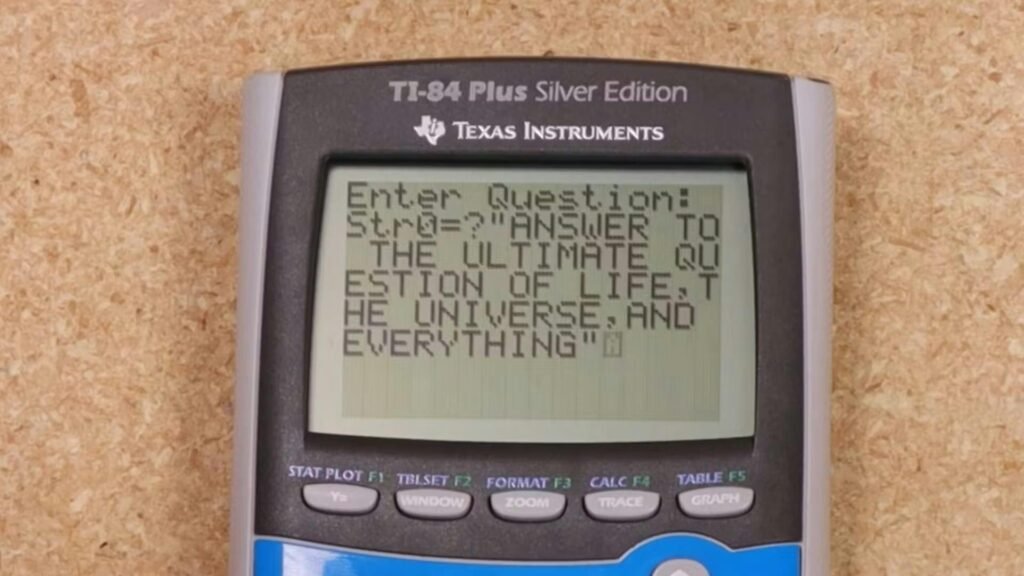A recent YouTube video showcasing a hacked TI-84 calculator with ChatGPT functionality has reignited debates about technology and academic integrity in education.
This “ultimate cheating device,” as dubbed by its creator, allows students to access AI-generated responses during exams, raising concerns among educators about the evolving challenges of maintaining academic honesty in the age of artificial intelligence.
ChromaLock’s Calculator Hack

ChromaLock’s TI-84 calculator hack involves both hardware and software modifications to enable internet connectivity and ChatGPT access. The YouTuber used a Seeed Studio XIAO-ESP32-C3 microcontroller, small enough to fit inside the calculator’s shell, along with custom-designed PCB and software.
The open-source software suite, called TI-32, allows for features like test mode breakout and camera support in addition to ChatGPT functionality.
ChromaLock’s video demonstration showcases the device’s ability to run ChatGPT, display images, and use chat functions while maintaining the outward appearance of a standard TI-84 calculator.
- The hack utilizes the calculator’s link port for data transfer
- A GitHub repository hosts the TI-32 software with plans for future enhancements
- Potential upcoming features include web browsing, email, video playback, and Discord access
Enhanced Calculator Capabilities
The integration of AI technology into calculators has significantly expanded their capabilities beyond basic arithmetic.
Modern AI-enhanced calculators can now perform complex mathematical operations, provide step-by-step problem-solving guidance, and even offer natural language processing for interpreting word problems.
These advanced features allow students to tackle more sophisticated mathematical concepts and real-world applications.
- AI-powered calculators can generate graphs, solve equations, and perform statistical analyses
- Some models offer voice recognition for hands-free operation and accessibility
- Enhanced memory and processing power enable the storage of formulas and custom programs
While these capabilities raise concerns about academic integrity, they also present opportunities for deeper learning and more engaging math education when used appropriately.
Educators are exploring ways to leverage these tools to enhance understanding of mathematical concepts rather than simply producing answers.
Educational Integrity Concerns
The emergence of AI-enabled calculators has intensified concerns about academic integrity in educational settings. Nearly 25% of teachers have reported catching students using ChatGPT to cheat, according to a recent survey.
This development has prompted some large school districts, including Los Angeles, New York City, and Seattle, to ban ChatGPT access on school networks.
Educators worry that such devices could undermine learning objectives, particularly in subjects requiring critical thinking and problem-solving skills.
The situation echoes past debates over calculator use in classrooms, with some fearing AI tools may discourage students from developing fundamental computational abilities.
Educators’ Responses to AI
Faced with the challenge of AI-powered cheating devices, educators are developing new strategies to maintain academic integrity.
Some teachers are redesigning assignments to be less vulnerable to AI assistance, focusing on tasks that require personal analysis and critical thinking.
Others advocate for integrating AI literacy into curricula, teaching students how to understand and use these technologies responsibly.
Denise Pope, a senior lecturer at Stanford Graduate School of Education, notes that despite concerns, their research hasn’t shown a significant increase in cheating rates due to AI tools.
Many educators argue that embracing and teaching proper use of AI technologies is ultimately more productive than attempting to ban them entirely, drawing parallels to the eventual acceptance of calculators in classrooms.
Future Implications for Classroom Technology
The future of classroom technology is poised to revolutionize education through immersive and personalized learning experiences.
Virtual and augmented reality technologies are expected to surge in classrooms, allowing students to engage in interactive 360-degree scenarios and virtual field trips that enhance understanding of complex subjects.
Artificial intelligence will play a crucial role in personalizing education, with AI-powered platforms providing adaptive learning experiences tailored to individual student needs.
- AI-driven chatbots and virtual teaching assistants will offer instant support to students
- Blockchain technology may be used for secure credential verification
- Gamification of learning activities will increase student engagement
- 5G connectivity will enable high-quality real-time remote learning experiences
As these technologies evolve, educators must address challenges such as data privacy concerns and the need for digital literacy skills.
The integration of advanced technologies in education offers exciting possibilities for enhancing learning outcomes, but it also requires careful consideration of ethical implications and equitable access to ensure all students can benefit from these innovations.
Source: Perplexity






